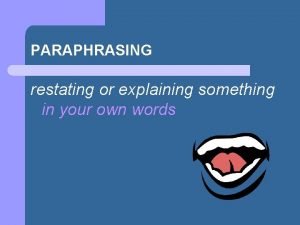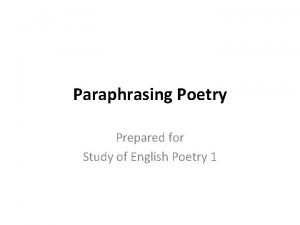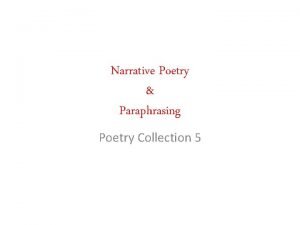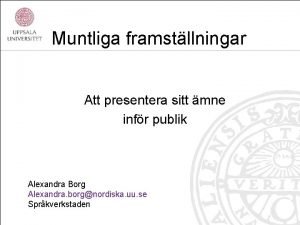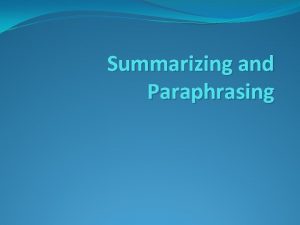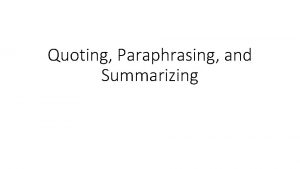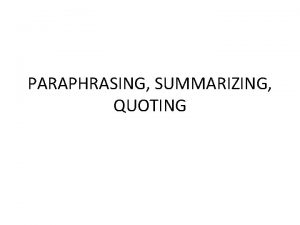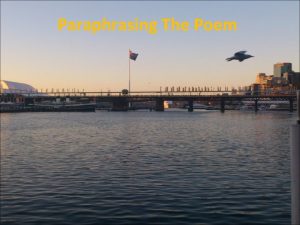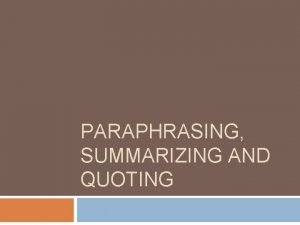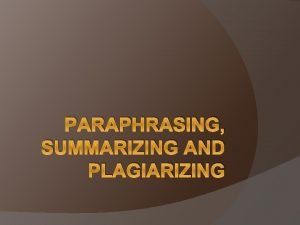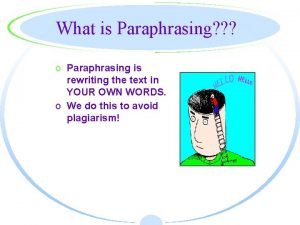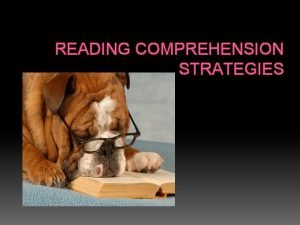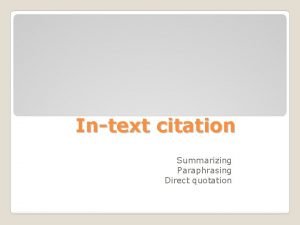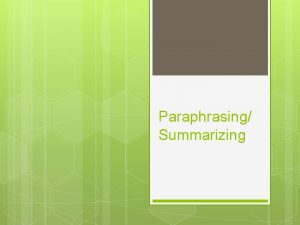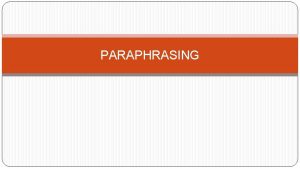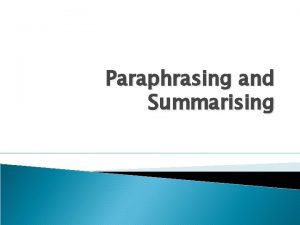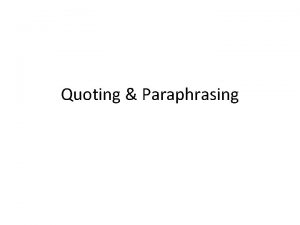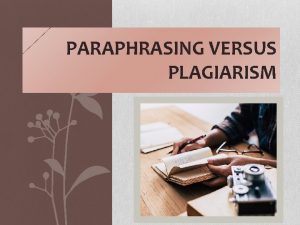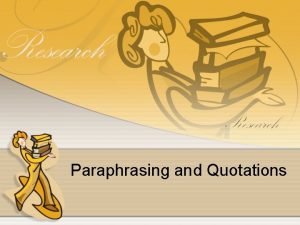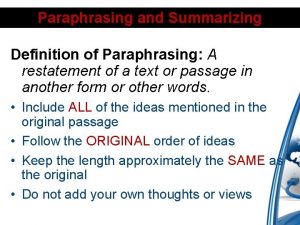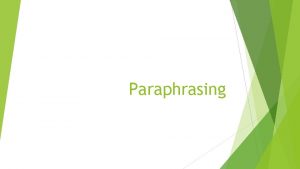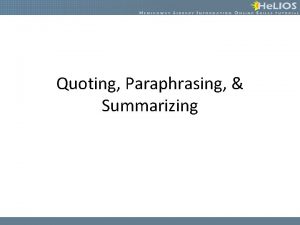Paraphrasing Poetry Prepared for Study of English Poetry
























- Slides: 24

Paraphrasing Poetry Prepared for Study of English Poetry 1

Summarizing and Paraphrasing (1) • Summarizing a text is condensing many lines of material into a single sentence or so while keeping the content clear. • A bad summary merely describes what the content is but leaves out context. I. e. , often a bad summary is so short the original meaning gets lost.

Summarizing and Paraphrasing • Example using the first four lines of Sappho's "Hymn to Aphrodite, " as it appears in Elizabeth Vandiver's translation: ORIGINAL VANDIVER TRANSLATION: Iridescent-throned Aphrodite, deathless Child of Zeus, wile-weaver, I now implore you, Don't--I beg you, Lady--with pains and torments Crush down my spirit. . • GOOD SUMMARY: In the opening lines, the speaker prays to Aphrodite, asking the goddess not to hurt her. • BAD SUMMARY: This is a prayer to Aphrodite.

Paraphrase • A paraphrase in the technical sense is quite different from a summary, because it puts the entire poem into prose, changing all key words and retaining all original ideas and images, in order to help a reader understand what is being said, literally, in the poem. A good paraphrase is hard to achieve — but even attempting it will help you in your ability to read and understand poetry.

Paraphrase Interpretation • This kind of paraphrase is not an interpretation of the poem. You are to retain the literal meaning of the words, not trying to decide at this point what they might symbolize or how the poet might be using them figuratively. However, you will want to take into account the context of the entire poem in deciding what literal meaning or meanings any given word or phrase might hold within it. Also, if the poem is not contemporary, consider carefully if some of the words may have had different meanings for the poet than they do for us; use of the Oxford English Dictionary (OED) or other good dictionary is very helpful in finding this out.

Not Merely Substituting words • A paraphrase, then, is not merely substituting words from your thesaurus for the ones in the poem. It must take into account what the poet’s words and phrases mean in relation to each other, and may in fact add somewhat to the poem to clarify the meaning — NOT adding an interpretation, but maybe an idea from a previous stanza in order to make the one being paraphrased easier to read and understand.

Takes Into Account Every Phrase • A paraphrase takes into account every phrase in the poem. It is almost always longer (never shorter) than the original because the poet’s words will be the precise ones — you will often need phrases where the poet uses a single word, or even sentences where the poet uses phrases, to approximate the poet’s meaning.

Stay In The Same Voice • A paraphrase also stays in the same voice as the poem. It does not contain phrases like “the poet says that” or change first-person (“I”) to third (“he” or “the speaker”). So if the poem says “I had no one left” you would paraphrase it something like this: “I was completely alone in the world. ”

Naturally and Easily • A paraphrase reads naturally and easily — not like a poorly worded poem but like a well worded prose piece. It should be written in prose form, in fact; do not use line breaks and try to make it look like the poem that it paraphrases. It will never have the elegance and force of the original, of course — but should sound good for what it is. Remember, in particular, that the paraphrase gives the literal meaning of the poem — not its theme or what you think its figurative meaning is.

Poetic Paraphrase • A poetic paraphrase, on the other hand, tries to restate every word or phrase in a new way. The goal in a paraphrase is to clarify the content by re-seeing and re-creating each word in every line. • Paraphrases may actually be longer than the original source (if that length makes the original easier to understand).

Poetic Paraphrase Here are the main points to keep in mind: 1. A good paraphrase captures every single word in the original without leaving out any ideas, description, or phrasing. 2. A good paraphrase doesn't merely repeat parts of the original using the same words. 3. A good paraphrase might re-order the lines slightly to improve the ease of understanding. 4. A good paraphrase might be longer than the original passage. 5. A good paraphrase helps you understand a confusing passage. 6. A good paraphrase helps you see multiple possible meanings in a passage you thought you understood on the first reading.

Poetic Paraphrase ORIGINAL VANDIVER TRANSLATION: Iridescent-throned Aphrodite, deathless Child of Zeus, wile-weaver, I now implore you, Don't--I beg you, Lady--with pains and torments Crush down my spirit. .

Poetic Paraphrase • Example: GOOD PARAPHRASE: Aphrodite sitting on the many-colored throne, immortal Daughter of [the chief] god, creator of many tricks, now I ask a favor of you, Please do not destroy my soul by flattening it with tortures and agonies --I plead with you, noble female. • ANOTHER GOOD PARAPHRASE: Goddess of love enthroned in light, never-dying Offspring of the God-king, [lady who] weaves together clever plans, I beg you now, Do not pulverize my soul--I ask you meekly, Mistress--with heartaches and suffering.

Poetic Paraphrase • If it is necessary to add extra words for clarity, use brackets [like this] to show that you have added some words that weren't in the original. On the next page, I have included some paraphrases that I think are poor in quality for contrast, using the same passage as the source.

Poetic Paraphrase ORIGINAL VANDIVER TRANSLATION: Iridescent-throned Aphrodite, deathless Child of Zeus, wile-weaver, I now implore you, Don't--I beg you, Lady--with pains and torments Crush down my spirit. .

Poetic Paraphrase • BAD PARAPHRASE #1 (too close to original): Iridescent-throned Aphrodite, immortal Child of Zeus, I now beg you, wile-weaver Don't--I implore you, Lady--with torments and pains Crush down my spirit. • BAD PARAPHRASE #2 (leaving out important ideas, words, or concepts) Aphrodite sitting on the throne, Divine girl, trickster, I ask you Not to smash me with tortures and sorrow.

Poetic Paraphrase • BAD PARAPHRASE #3 (changing from first to third person) The speaker asks Aphrodite on the glowing throne, the unkillable Daughter of Zeus, not to destroy her spirit with agony and sorrows. • BAD PARAPHRASE #4 (confusing Sappho with the poetic speaker) The poet Sappho must have been having a bad romance, because she asks the love-Goddess on the elaborate throne, the undying Daughter of the sky-God, not to squish her soul with misery and pains.

Other Tips 1. On a xerox copy, try underlining the subject of each clause once and underline each subject's verb(s) twice in the original passage. That will help you really see who's doing what in the original sentence if you don't understand it. 2. Look up words when you don't know the meaning of them. 3. When your paraphrase is done, go through your paraphrase and compare it to the original one word at time. Place a checkmark on each word in the original if you can find and circle the corresponding part in your paraphrase that captures that idea. If you can't find a matching section or word in your own paraphrase, you have a problem. 4. A thesaurus can be a big help if you need to think of another word for the original. If you are reading a difficult passage, and you can't figure out what it means initially, try paraphrasing it. For a short work, try paraphrasing the entire poem.

Sample Paraphrase “The Pitcher” by Robert Francis His art is eccentricity, his aim How not to hit the mark he seems to aim at, His passion how to avoid the obvious, His technique how to vary the avoidance. The others throw to be comprehended. He Throws to be a moment misunderstood. Yet not too much. Not errant, arrant, wild, But every seeming aberration willed. Not to, yet still, still to communicate Making the batter understand too late.

Sample of Paraphrase (2) • Paraphrase of “The Pitcher” by Robert Francis The craft of the pitcher is the variation of his pitches; his goal is to avoid hitting the point he appears to target. His zeal is to obscure his intention; his strategy is the many different ways he attains this obscurity. His teammates fling the ball so that its destination will be clearly understood. He pitches it so that its destination will be hidden just for a second. But not hidden completely — his pitch is not a mistake, nor malicious in intent, nor out of control. Rather, every apparent oddity is carefully crafted. His purpose is to avoid letting the batter know his intention, and yet also letting him know — just after he misses.

Notes on Paraphrasing “The Pitcher” • It doesn’t refer to poetry, even though the poet is describing the poet’s work by analogy, because the poem never mentions poetry. (That would be interpretation, not paraphrase. ) • It does break the poem into separate sentences in places where the original continues with comma breaks — this is to help make the prose rendition clearer and to comply with prose conventions. It also supplies sentence subjects where the poet has left them out for poetic effect, etc. , and sometimes changes the order of ideas slightly to make their relationship to each other clearer. • It does not leave any key words unchanged. The point of the paraphrase is to try to see what the poem communicates by figuring out what the key words mean and, in a sense, “defining” them through synonymous words and phrases (sometimes some explanation is in order, even, because if the poet has used the best words for his purpose, you won’t find exact synonyms and might need to qualify the words you use to clarify their meaning).

Assignment (Paraphrase the Poem) “Bereft” by Robert Frost Where had I heard this wind before Change like this to a deeper roar? What would it take my standing there for, Holding open a restive door, Looking down hill to a frothy shore? Summer was past and the day was past. Somber clouds in the west were massed. Out on the porch’s sagging floor, Leaves got up in a coil and hissed, Blindly striking at my knee and missed. Something sinister in the tone Told me my secret my be known: Word I was in the house alone Somehow must have gotten abroad, Word I was in my life alone, Word I had no one left but God.

Paraphrase of Robert Frost’s “Bereft” Note how it is written in prose form, every word and phrase in the poem is taken account of, and it remains at the literal level of the poem’s language. Interpretation cannot take place until after the literal words of the poem can be understood.

References 1. 2. Dr. Beth Impson; http: //bethimpson. wordpress. com/courses/english 211/211 -paraphrasing-poetry/ web. cn. edu/kwheeler/documents/paraphrase. pdf
 Paraphrase poetry
Paraphrase poetry Paraphrase
Paraphrase Narrative paraphrase
Narrative paraphrase Formuö
Formuö Typiska drag för en novell
Typiska drag för en novell Nationell inriktning för artificiell intelligens
Nationell inriktning för artificiell intelligens Vad står k.r.å.k.a.n för
Vad står k.r.å.k.a.n för Shingelfrisyren
Shingelfrisyren En lathund för arbete med kontinuitetshantering
En lathund för arbete med kontinuitetshantering Underlag för särskild löneskatt på pensionskostnader
Underlag för särskild löneskatt på pensionskostnader Personlig tidbok för yrkesförare
Personlig tidbok för yrkesförare A gastrica
A gastrica Densitet vatten
Densitet vatten Datorkunskap för nybörjare
Datorkunskap för nybörjare Stig kerman
Stig kerman Hur skriver man en debattartikel
Hur skriver man en debattartikel Delegerande ledarskap
Delegerande ledarskap Nyckelkompetenser för livslångt lärande
Nyckelkompetenser för livslångt lärande Påbyggnader för flakfordon
Påbyggnader för flakfordon Arkimedes princip formel
Arkimedes princip formel Svenskt ramverk för digital samverkan
Svenskt ramverk för digital samverkan I gullregnens månad
I gullregnens månad Presentera för publik crossboss
Presentera för publik crossboss Argument för teckenspråk som minoritetsspråk
Argument för teckenspråk som minoritetsspråk Kanaans land
Kanaans land
